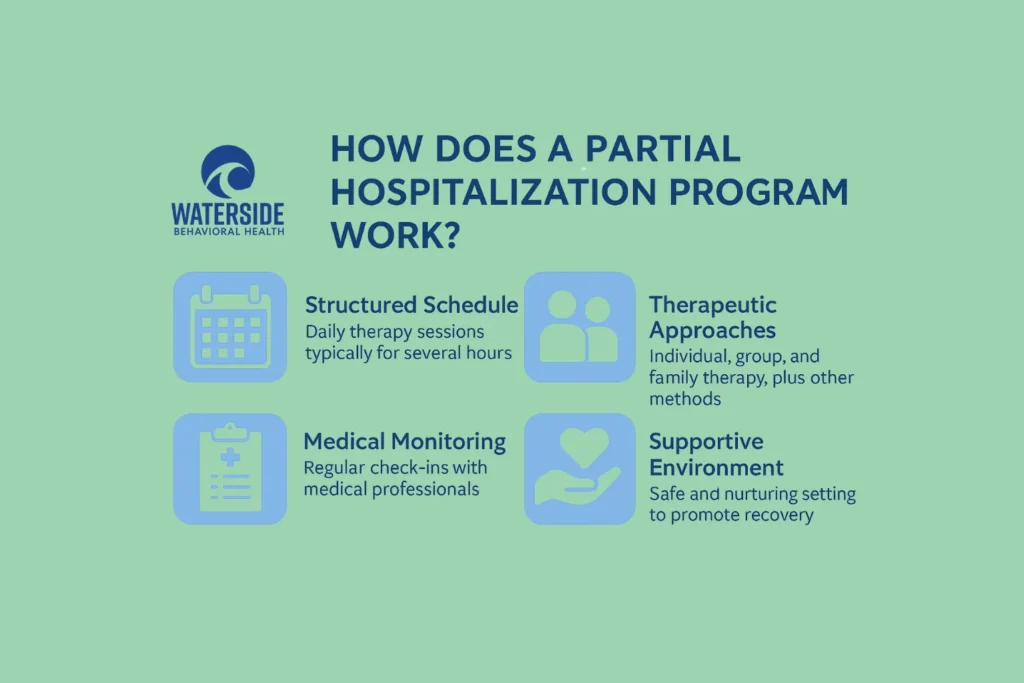There are many different ways to treat somebody struggling with behavioral health issues. Some of these may include less intensive options like therapy for mental health; others may include more intensive programs like partial hospitalization. The method of treatment for behavioral health should always be dependent on the individual; it gives the patient the best chance at long-term recovery success. This is why, at Waterside BHC, we’re committed to providing individualized treatment options for those who step through our facility doors. Ultimately, we want to see people with behavioral health struggles succeed for the rest of their lives; if we can be a part of that, it’s worth it to us.
A successful Partial Hospitalization Program combines evidence-based and holistic treatment modalities. Your PHP treatment team will create an individual treatment plan with treatment goals. Some of the key components of your partial hospitalization will likely include:
PHPs benefit people with psychiatric disorders like severe depression, anxiety, bipolar disorder, personality disorders, trauma-related disorders, and substance use disorders. These programs offer intensive support to help individuals manage symptoms and improve functioning without requiring full-time hospitalization; this also is ideal for those who require a stepping stone between a treatment facility and the outside world.
Partial hospitalization programs (PHPs) are essential in mental health treatment; they offer a middle ground for individuals who require more support than outpatient treatment provides but don’t need full hospitalization. These programs offer structured therapy and support, usually five to seven days a week; throughout this time, individuals have access to psychiatrists, therapists, and other mental health professionals.
PHPs are crucial for those managing serious but stable mental health conditions. This could include major depression, bipolar disorder, and anxiety. PHPs reduce the risk of relapse and hospitalization by offering daily coping strategies, emotional support, and skill-building. This continuity of care fosters stability, helping individuals progress in their recovery journey while maintaining a connection to their everyday lives.
Partial hospitalization programs (PHPs) are a form of care that provide people experiencing serious mental health challenges the treatment they need; these individuals are ones who do not require 24-hour inpatient care but still need help for serious behavioral health issues. PHPs typically involve spending several hours a day, multiple days a week, in a treatment facility. Here, participants engage in therapy, education, and skill-building activities to support their mental and emotional health. At the end of each day, participants return home, allowing them to balance intensive treatment with life outside the facility.

The length of PHPs for behavioral health varies depending on an individual’s needs, diagnosis, and response to treatment; generally speaking, most programs last between two to six weeks. Each day, participants engage in intensive therapy, typically for six to eight hours, five days a week. The goal is to provide comprehensive, structured support that equips individuals with coping skills, emotional regulation, and tools to manage symptoms.
For some, PHP may serve as a step-down from inpatient hospitalization; for others, it’s a step-up from outpatient care to stabilize a crisis. The duration of PHPs are oftentimes tailored to allow for maximum progress. This ensures that individuals gain the necessary stability to transition to a less intensive form of care.
Partial hospitalization programs (PHPs) for behavioral health offer several key benefits, providing a supportive bridge between inpatient and outpatient care. One major benefit is the daily, intensive therapy. This therapy helps individuals build and practice coping skills, gain insights, and work through challenging behaviors in a structured setting. PHPs also promote stability by providing consistent access to mental health professionals and peer support; this can significantly reduce feelings of isolation. Additionally, PHPs allow individuals to return home in the evenings, striking a balance between therapy and a comforting, familiar environment.
A Partial Hospitalization Program offers a middle ground between inpatient and outpatient care—providing intensive mental health care during the day, while allowing clients to return home each evening. It’s especially effective for people with mood disorders, anxiety disorders, or co-occurring conditions like substance abuse and Obsessive-Compulsive Disorders.
Unlike general therapy, PHPs are staffed by a multidisciplinary team that may include:
Board-certified psychiatrists
Licensed therapists trained in Cognitive Behavioral Therapy (CBT) and Dialectical Behavioral Therapy (DBT)
Behavioral health specialists for crisis management and support
Case managers who coordinate logistics, discharge, and community referrals
Each client begins with a thorough psychiatric evaluation to determine the right treatment path. The program typically includes 20–30 hours per week of structured psychiatric treatment, therapy groups, and personalized support. This level of care is ideal for stabilizing acute mental health symptoms while developing skills for long-term recovery.
Partial hospitalization programs (PHPs) for behavioral health are designed for those who require intensive treatment but do not need round-the-clock care. PHPs are ideal for those managing moderate to severe mental health conditions. This could include major depressive disorder, bipolar disorder, severe anxiety, post-traumatic stress disorder (PTSD), or certain personality disorders.
PHPs can be particularly beneficial for those transitioning out of inpatient care. PHP participants often have difficulty with daily functioning or emotional regulation. However, they remain committed to improving their mental health and are motivated to engage actively in treatment. By providing a supportive environment that focuses on skill-building, symptom management, and social support, PHPs offer a pathway toward greater independence.
Determining whether you need a partial hospitalization program (PHP) for behavioral health involves evaluating a variety of factors: the severity and impact of your symptoms, your support network, and your current level of functioning. PHP might be a good fit if symptoms of mental health conditions disrupt your daily life but don’t require constant supervision. PHPs are often recommended if traditional outpatient therapy isn’t sufficient and you need more structured support; they offer intensive, daily therapeutic interventions.
Signs that PHP may be beneficial include the following:
If you’re stepping down from inpatient care or your mental health worsens without ongoing daily support, pursuing PHP might be best. Consulting with a mental health provider can help determine if PHP aligns with your treatment goals. Waterside Behavioral Health is here to help you determine which method of care is best for you.
SAMHSA. “National Mental Health Services Survey (NMHSS): 2019.” SAMHSA.gov, July 2020 https://www.samhsa.gov/data/sites/default/files/reports/rpt29388/2019_NMHSS/2019_NMHSS.htm
National Association for Behavioral Healthcare. “Partial Hospitalization.” NABH.org, 2024 https://www.nabh.org/government-relations/partial-hospitalization/
National Association for Behavioral Healthcare. “Partial Hospitalization.” NABH.org, 2024 https://www.nabh.org/government-relations/partial-hospitalization/
The Kaiser Family Foundation. “SUD Treatment in Medicaid: Variation by Service Type, Demographics, States and Spending.” KFF.org, March 2024 https://www.kff.org/mental-health/issue-brief/sud-treatment-in-medicaid-variation-by-service-type-demographics-states-and-spending/
It isn’t easy struggling with mental or behavioral health issues. At Waterside Behavioral Therapy, we believe in providing individualized treatment options for those struggling. If you or a loved one would like to find out more, you can contact us here; you can also fill out the form below.
Waterside Behavioral Health is a renowned and accredited provider of an evidence based partial hospitalization program located in Plymouth, Massachusetts. We offer a supportive and nurturing environment to help clients achieve their goals.



